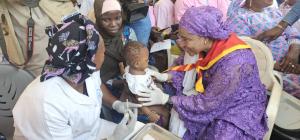Mali: Greater protection for children against malaria
Bamako – Fatoumata, aged 2 years and 4 months and wearing one of her most beautiful dresses, attended an event of great importance for her health on Friday morning, as her mother Niemba explains: “I was on my way to the community health centre for my child’s routine vaccination; from there, I was directed to the site of the ceremony where a new vaccine protecting children against malaria was being launched.”
The event took place on World Malaria Day, 25 April, in Kalaban-Coro, 11 km from Bamako, and was attended by many mothers and their children. This was an opportunity to introduce the malaria vaccine, making Mali the 20th African country to incorporate it into its Expanded Programme on Immunization (EPI). More importantly, Mali became the first country in the world to use a hybrid vaccination approach to combat malaria.
This approach combines two ways of administering the vaccine: children aged between 5 and 36 months receive the first three doses according to age, while the fourth and fifth doses are administered seasonally before the peak malaria transmission season in May or June.
This maximizes protection for children and has been received with great relief at national level. “The introduction of the malaria vaccine is highly significant for Mali. Moreover, this new approach, which synchronizes the period of greatest vaccine protection with the period when the risk of malaria is highest, optimizes the effectiveness of the vaccine in a country like ours, where transmission of the disease occurs in specific seasons,” says Dr Ibrahima Diarra, Director General of the National Immunization Centre.
Children under the age of 5 are especially vulnerable to malaria, as they have not yet built immunity through years of exposure.
Mali is among the 11 countries with the highest malaria burden, contributing 3% of the global malaria burden. In 2023, the incidence of malaria was 273%, with a mortality rate of 5.8 per 100 000 people in the general population. This situation is particularly concerning given that Mali is also among the eight countries where malaria cases rose significantly between 2019 and 2023, with an increase of 1.4 million cases. Malaria transmission in Mali is seasonal, with most cases occurring between July and December.
The hybrid approach has been studied in clinical trials in Mali, showing that seasonal administration of the RTS,S vaccine, combined with seasonal malaria chemoprevention (SMC) – a preventive treatment given monthly during the rainy season – offers superior protection to each of the interventions used in isolation.
Both the RTS,S and R21 vaccines have been prequalified and recommended by the World Health Organization (WHO) for the prevention of malaria in children. These safe and effective vaccines target the deadliest and most widespread malaria parasite in Africa.
According to Dr Patrick Kabore, WHO Representative in Mali, “the malaria vaccine is bringing great relief to communities and to the health system in general”.
“We will continue to support this momentum, particularly by backing the national programme to combat and eliminate this disease, which often has severe consequences for the most vulnerable,” he said.
The launch of the malaria vaccine complements other existing preventive measures, such as the use of insecticide-treated bed nets, intermittent preventive treatment during pregnancy, indoor insecticide spraying and community awareness campaigns in favour of the vaccine and to combat misinformation.
With support from partners such as Gavi and UNICEF, the R21/Matrix-M vaccine will initially be rolled out in 19 priority districts across five regions of the country: Kayes, Koulikoro, Mopti, Ségou and Sikasso.
In Kalaban-Coro, Niemba was happy that her little Fatoumata was one of the first children to receive the vaccine: “My daughter has already been sick with malaria in the past. We live in a neighborhood that isn’t very clean, and our children suffer a lot from this disease. This initiative is a great relief for us, because if our child is ill, the whole family suffers, not to mention the expense involved.”
WHO assistant (Library)
Email: cissea [at] who.int (cissea[at]who[dot]int)
Communications Officer
WHO Regional Office for Africa
Email: dialloka [at] who.int (dialloka[at]who[dot]int)



